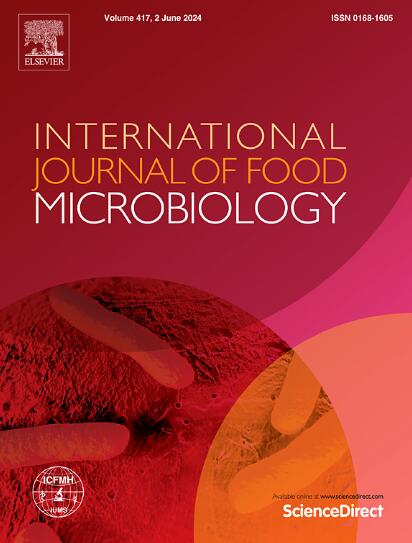角化酶产芽孢杆菌固态发酵提高玉米蛋白粉中小肽含量,改善微生物群落和代谢产物
IF 5
1区 农林科学
Q1 FOOD SCIENCE & TECHNOLOGY
International journal of food microbiology
Pub Date : 2025-06-14
DOI:10.1016/j.ijfoodmicro.2025.111320
引用次数: 0
摘要
玉米蛋白粉被认为是高质量植物性蛋白质的潜在来源。在固态发酵过程中加入角化酶可提高其蛋白质品质。然而,角化酶的广泛应用受到其高昂的生产成本的制约。本研究分离了两株能产生角化酶的芽孢杆菌。与单独发酵相比,枯草芽孢杆菌LDJ01和siamensis LDJ02混合菌液(SS)发酵能更有效地降解玉米麸-麦麸混合物(CGW)中的大分子蛋白。发酵后,CGW的小肽含量显著增加,SS具有替代角化酶的潜力。此外,添加SS提高了CGW的营养价值,改变了CGW的整体气味。此外,在发酵过程中,SS能抑制泛菌和假单胞菌等病原菌在CGW中的生长,同时促进SCFAs、谷胱甘肽、石胆酸和乳酸等有益代谢物的富集。值得注意的是,CGW的发酵过程主要涉及氨基酸和脂质代谢途径的变化。综上所述,本研究为植物蛋白资源的开发提供了一个可行的解决方案。本文章由计算机程序翻译,如有差异,请以英文原文为准。
Enhancing small peptide content and improving the microbial community and metabolites in corn gluten meal with solid-state fermentation using keratinase-producing Bacillus strains
Corn gluten meal is recognized as a potential source of high-quality plant-derived proteins. The enhancement of its protein quality can be accomplished through the incorporation of keratinase during solid-state fermentation. However, the widespread application of keratinase is constrained by its high production costs. In this study, two Bacillus strains capable of producing keratinase were isolated. Compared to separate fermentation processes, B. subtilis LDJ01 and B. siamensis LDJ02 mixed bacteria solution (SS) fermentation could more efficiently degrade large proteins in the corn gluten-wheat bran mixture (CGW). After fermentation, the small peptide content of the CGW was significantly increased and the SS showed the potential to replace keratinase. Moreover, the addition of SS improved the nutritional value and changed the overall odor of the CGW. Furthermore, the SS could inhibit the growth of pathogenic bacteria including Pantoea and Pseudomonas in the CGW, while promoting the enrichment of beneficial metabolites such as SCFAs, glutathione, lithocholic acid and lactobionic acid during fermentation. Notably, the fermentation process of the CGW primarily involved changes in amino acid and lipid metabolic pathways. Overall, this study provides a feasible solution for the development of plant-based protein resources.
求助全文
通过发布文献求助,成功后即可免费获取论文全文。
去求助
来源期刊
CiteScore
10.40
自引率
5.60%
发文量
322
审稿时长
65 days
期刊介绍:
The International Journal of Food Microbiology publishes papers dealing with all aspects of food microbiology. Articles must present information that is novel, has high impact and interest, and is of high scientific quality. They should provide scientific or technological advancement in the specific field of interest of the journal and enhance its strong international reputation. Preliminary or confirmatory results as well as contributions not strictly related to food microbiology will not be considered for publication.

 求助内容:
求助内容: 应助结果提醒方式:
应助结果提醒方式:


